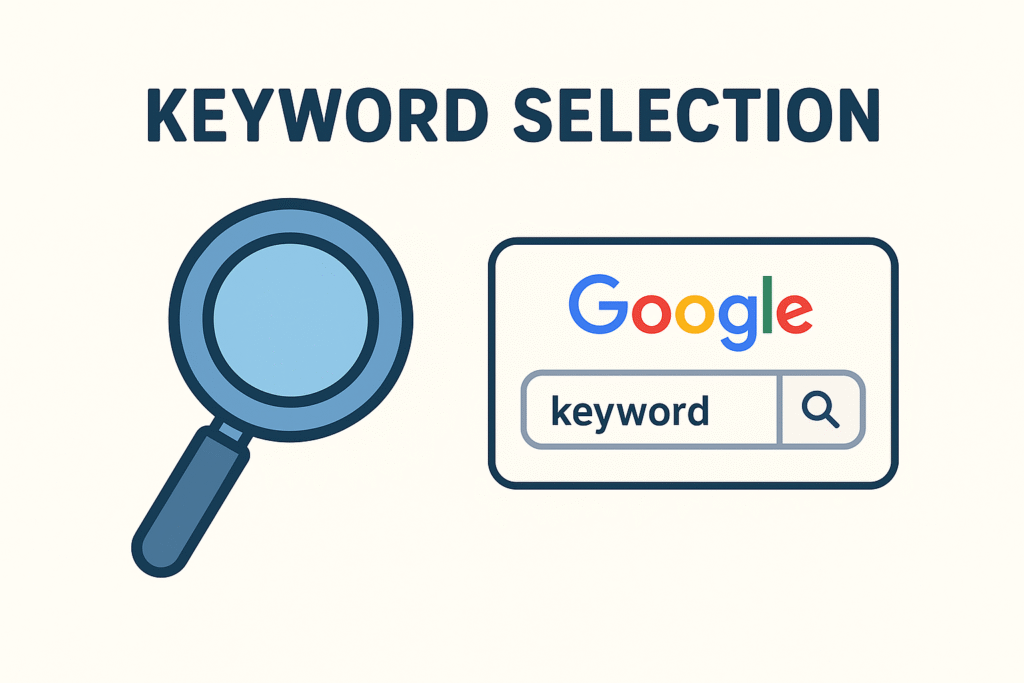How to Select SEO Keywords the Smart Way

When it comes to SEO, everything is about choosing the right set of keywords. It is the bridge between what people are searching for and the solutions you provide. Yet many businesses fail in finding SEO keywords. They either guess it or chase the ones with high search volume, only to find they bring little to no result at all.
Honestly, it’s not about choosing the keywords with high search volume but to understand the intent behind the search. Realistically thinking about your competition, and connecting those terms with what aligns with your business goals, is a more systematic method of finding SEO keywords.
In a diverse market like SEO Sydney, it becomes critical when competitive environments are at play. Having the right keywords is the key to not being invisible on search and to stand out as a top player in your industry.
Consider the Person’s Intent
When you find SEO keywords, it’s easy to focus on what looks popular. High-volume search terms can be fascinating and can feel like the actual target. However, in reality it often fails in bringing qualified traffic to your website.
Search intent plays the most essential role in keyword strategy. A keyword with less search volume but clear buying intent adds the actual more in your keyword selection.
Take an example of a dentist, a search for “dentist” is far more broad, and it might likely attract people out of your service location. Whereas, “Dentist in parrmatta” will attract less traffic but will likely book an appointment. This means a sheer focus on buying intent has higher potential value than chasing high-search volume.
Be Realistic. Think About Competition
Not every word is meant for your business. Websites that are already established with strong presence and years of content actually have the upper hand in competitive search terms. However, for new websites it’s an uphill battle.
Studying your competition is key. If your website’s authority is less or say it’s a totally new website, it’s always recommended that you use achievable keywords that have potential to rank.
Authority grows with time, consistent optimisation, quality back links, and strong presence. Without building backlinks, even the best keyword strategy won’t work.
Be Careful with Keyword Cannibalisation
Keyword cannibalisation happens when multiple pages in your website are competing over the same keyword. This is usually enough to bring down your ranking potential. It confuses search engines and critically impacts your visibility.
For example, say you have multiple blog posts on your website targeting “SEO . In such cases, Google may literally struggle to find the most relevant page for ranking. Often, the result is less to no performance at all.
The best way to avoid this situation is to set a keyword focus for each page in your website. It is essential to structure your website’s content to carry a dedicated purpose each page, matching with your business goals.
Value to the Business
Keywords are not only for attracting traffic but to also provide legitimate value to the visitors. Focusing on the buyer’s journey is essential in this stage as it will give you a clear idea of what your customers are experiencing.
Top of the funnel
These are essential to bring people who are researching or at an unaware stage. For example, “What is local SEO” should be useful to grow awareness. However, these people may not be potential buyers.
Middle of the funnel
Keywords for the MOFU stage are usually good for people who are looking into several options. Maybe they are comparing different businesses for landing on a decision. For example, “concrete resurfacing cost Brisbane” means people are still considering service providers and are looking for assurances before reaching out.
Bottom of the funnel
This is the conversion stage or a buying intent signal. Keywords such as “roofer near me” or “accountant sydney” are green signal people are ready to buy.
A smart strategy will always maintain a balance in these three stages. Information based keywords are good for building trust and authority, middle stage keywords are used more to nurture your audience, and conversion focused keywords drive business growth. For a closer look on how to fit your budget through these stages, read average cost of SEO for small businesses.
How AI is Changing the Way We View Keywords
Thanks to AI, search behaviour is rapidly changing. AI overviews appearing on Google search results and other search engines, takes away a good share of clicks that once went directly to websites. Recent studies show AI overviews are to reduce traffic by 30% more in specific industries.
Three major implications for keyword strategy
Information based keywords will be less relevant to the traffic
There are multiple AI tools that can handle complex, informative questions in seconds. For example, “what is SEO” can be fully answered by an AI overview, leaving less audience to click through a website.
Importance of transactional and local searches
AI overviews are good for informative searches but are less likely to respond to personalised service enquiries. Keywords with buying intent are at heavy play here. For example, “SEO consultant Newcastle” or “SEO expert in Sydney”, remaining important drivers of leads as these tasks require trustworthy human partnership.
Originality and Authority in 2025
Search engines are consistently updating their policies against AI generated content. Content that is beyond generic value, case studies, data and local expertise are now important to stand against AI generated overviews.
For businesses, it means more focus on keyword research and balance between informational content and high buying intent.
How to Create Content for the Keyword
The real work begins when you find SEO keywords. Determining how your content is designed with the keywords brings the original value here.
Old methods of keyword stuffing need to be discarded. It damages the readability of your website along with a downfall in ranking. Key practice is to focus on content that actually matters to your audience, cater to their pain point, and communicate solutions you have. The objective will always be to genuinely answer the search query.
Ai tools can be great partners in researching your market, drafting your copies. However, relying completely on mass-produced AI content could be risky. Search engines are constantly monitoring AI content but also rewarding expertise and originality.
Wrapping Up
Choosing the right set of keywords is a combination of science and art. It needs a balance between intent, competition and business values while staying updated on how AI is shifting search behaviour.
Businesses that look beyond generic numbers are more likely to succeed in the current competitive environments. Keyword selection should always consist of purpose, relevance and measurable results in order to stand out.
If you are someone experiencing ineffective SEO, you need to start building a strategic plan with an experienced SEO Consultant. Book a call today for a tailored SEO strategy for your business.
FAQs
The best practice is to align keywords with buying intent and your business goals. Instead of selecting keywords with high search volume, select keywords based on the buyer’s intent for qualified leads.
Local SEO ideally helps a business attract traffic from the suburbs. It’s best for onboarding local qualified leads. Learn more on the Local SEO page.
Keyword cannibalisation happens when multiple pages in your website are competing over the same keyword, affecting your online presence. The best practice is to assign unique keywords for each page with clear purpose.
AI can effortlessly support market research and drafting. However, being too reliant on AI content can definitely affect your ranking. Search engines continue to reward authority, quality and originality.
About the author

Aidan Coleman
Aidan Coleman is an SEO specialist who started out in digital marketing before honing in on search. Realising the complexity and the misinformation in the industry, he began freelancing and building his own site to prove what good SEO really looks like. Today, he helps businesses grow with clear, honest, and effective SEO strategies.